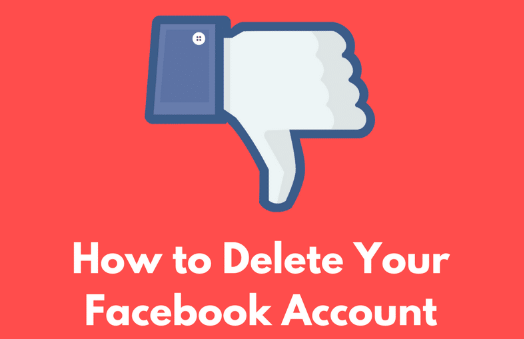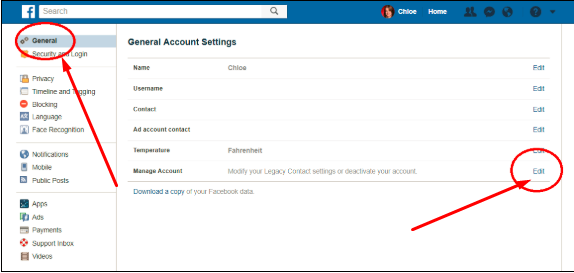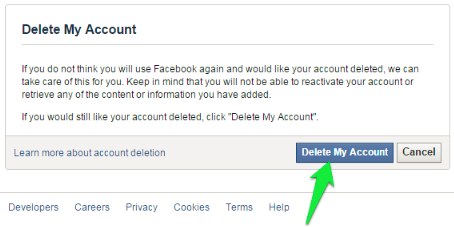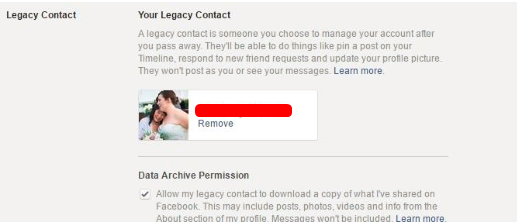Should I Delete My Facebook Account 2019
By
MUFY UJASH
—
Aug 21, 2019
—
Deleting Facebook Account
Recent events could have you pondering a break from Facebook. That's not an option for every person; in that case, just tighten up your account settings. Should I Delete My Facebook Account: But if having your data mined for political functions without your permission illustrations you out, there are ways to separate on your own from the enormous social media network.
If you're ready for a social networks break, here's how to delete Facebook.
Should I Delete My Facebook Account
Deactivating
Facebook provides you 2 choices: two alternatives: deactivate or remove
The very first couldn't be much easier. On the desktop computer, click the drop-down menu at the top-right of your screen and also choose settings. Click General on the top left, Edit alongside "Manage Account" Scroll down as well as you'll see a "Deactivate My Account" link near the bottom. (Below's the direct link to utilize while visited.).
If you get on your mobile device, such as using Facebook for iOS, in a similar way go to settings > Account settings > General > Manage Account > Deactivate.
Facebook doesn't take this gently - it'll do whatever it could to keep you around, including emotional blackmail regarding how much your friends will miss you.
Thus, "Deactivation" is not the like leaving Facebook. Yes, your timeline will certainly go away, you won't have accessibility to the site or your account through mobile applications, friends can't post or contact you, and you'll shed accessibility to all those third-party solutions that utilize (or call for) Facebook for login. But Facebook does not remove the account. Why? So you can reactivate it later.
Just in case that expected re-activation isn't in your future, you must download a copy of all your data on Facebook - posts, images, videos, talks, etc.-- from the settings menu (under "General"). Exactly what you discover may shock you, as our Neil Rubenking found out.
Account Deletion
To completely erase your Facebook account forever and ever, most likely to the Delete My Account page at https://www.facebook.com/help/delete_account. Simply understand that, each the Facebook data use policy "after you remove information from your account or erase your account, copies of that details could stay readable in other places to the extent it has actually been shown others, it was or else dispersed according to your personal privacy settings, or it was replicated or saved by other users.".
Translation: if you created a discuss a close friend's condition update or photo, it will certainly stay after you remove your own profile. Several of your posts and also images might hang around for as long as 90 days after deletion, as well, however just on Facebook servers, not live on the website.
Removal in behalf of Others
If you wish to inform Facebook about a customer you know is under 13, you can report the account, you narc. If Facebook could "sensibly confirm" the account is utilized by someone underage-- Facebook bans children under 13 to abide by government legislation-- it will erase the account quickly, without notifying anybody.
There's a different form to demand removal of represent people that are clinically incapacitated as well as thus unable to use Facebook. For this to function, the requester should show they are the guardian of the person in question (such as by power of attorney) along with deal an official note from a doctor or clinical center that spells out the incapacitation. Edit any type of information necessary to keep some personal privacy, such as clinical account numbers, addresses, etc.
If a user has passed away, a heritage get in touch with-- a Facebook good friend or family member that was assigned by the account proprietor before they died-- can obtain accessibility to that individual's timeline, as soon as approved by Facebook. The legacy get in touch with might should offer a connect to an obituary or other documents such as a fatality certification. Facebook will certainly "memorialize" the web page so the dead timeline survives (under control of the heritage call, that can not post as you), or if preferred, remove it.
Designate a certain tradition contact person to handle your account after your passing away. You can discover that under settings > General > Manage Account > Your Legacy Contact. Once you set one up, you'll get a notice annually from Facebook to check that the contact need to stay the same, unless you pull out of that. You can additionally take the extra action of seeing to it that after you die, if the tradition call does report you to Facebook as departed, your account gets removed (even if the heritage get in touch with wants the timeline to be memorialized).
If you're ready for a social networks break, here's how to delete Facebook.
Should I Delete My Facebook Account
Deactivating
Facebook provides you 2 choices: two alternatives: deactivate or remove
The very first couldn't be much easier. On the desktop computer, click the drop-down menu at the top-right of your screen and also choose settings. Click General on the top left, Edit alongside "Manage Account" Scroll down as well as you'll see a "Deactivate My Account" link near the bottom. (Below's the direct link to utilize while visited.).
If you get on your mobile device, such as using Facebook for iOS, in a similar way go to settings > Account settings > General > Manage Account > Deactivate.
Facebook doesn't take this gently - it'll do whatever it could to keep you around, including emotional blackmail regarding how much your friends will miss you.
Thus, "Deactivation" is not the like leaving Facebook. Yes, your timeline will certainly go away, you won't have accessibility to the site or your account through mobile applications, friends can't post or contact you, and you'll shed accessibility to all those third-party solutions that utilize (or call for) Facebook for login. But Facebook does not remove the account. Why? So you can reactivate it later.
Just in case that expected re-activation isn't in your future, you must download a copy of all your data on Facebook - posts, images, videos, talks, etc.-- from the settings menu (under "General"). Exactly what you discover may shock you, as our Neil Rubenking found out.
Account Deletion
To completely erase your Facebook account forever and ever, most likely to the Delete My Account page at https://www.facebook.com/help/delete_account. Simply understand that, each the Facebook data use policy "after you remove information from your account or erase your account, copies of that details could stay readable in other places to the extent it has actually been shown others, it was or else dispersed according to your personal privacy settings, or it was replicated or saved by other users.".
Translation: if you created a discuss a close friend's condition update or photo, it will certainly stay after you remove your own profile. Several of your posts and also images might hang around for as long as 90 days after deletion, as well, however just on Facebook servers, not live on the website.
Removal in behalf of Others
If you wish to inform Facebook about a customer you know is under 13, you can report the account, you narc. If Facebook could "sensibly confirm" the account is utilized by someone underage-- Facebook bans children under 13 to abide by government legislation-- it will erase the account quickly, without notifying anybody.
There's a different form to demand removal of represent people that are clinically incapacitated as well as thus unable to use Facebook. For this to function, the requester should show they are the guardian of the person in question (such as by power of attorney) along with deal an official note from a doctor or clinical center that spells out the incapacitation. Edit any type of information necessary to keep some personal privacy, such as clinical account numbers, addresses, etc.
If a user has passed away, a heritage get in touch with-- a Facebook good friend or family member that was assigned by the account proprietor before they died-- can obtain accessibility to that individual's timeline, as soon as approved by Facebook. The legacy get in touch with might should offer a connect to an obituary or other documents such as a fatality certification. Facebook will certainly "memorialize" the web page so the dead timeline survives (under control of the heritage call, that can not post as you), or if preferred, remove it.
Designate a certain tradition contact person to handle your account after your passing away. You can discover that under settings > General > Manage Account > Your Legacy Contact. Once you set one up, you'll get a notice annually from Facebook to check that the contact need to stay the same, unless you pull out of that. You can additionally take the extra action of seeing to it that after you die, if the tradition call does report you to Facebook as departed, your account gets removed (even if the heritage get in touch with wants the timeline to be memorialized).







